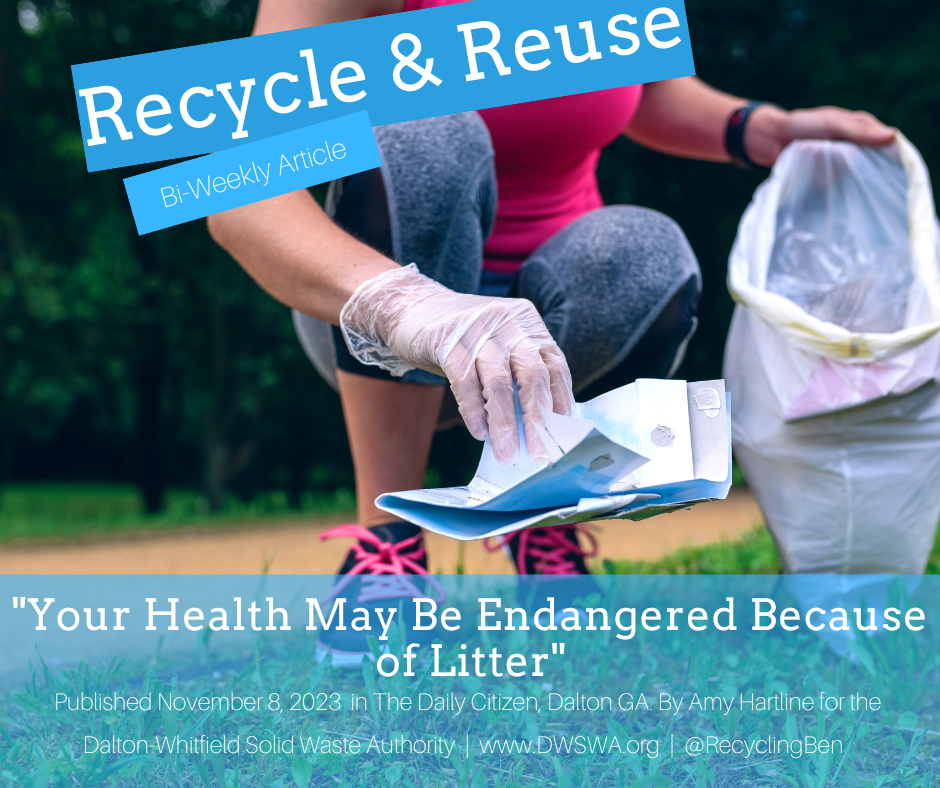Your Health May Be Endangered Because of Litter
/One of my favorite times of year for my job is when we deliver the checks for our beautification grants that Keep Dalton-Whitfield Beautiful gives out. We give them out each year in honor of National Planting Day and it is always exciting to see what new beautification projects happen because of these grants.
One of these times, I was able to deliver the check to a local high-school whose students had applied for the grant as a group. They were so excited because they were going to be completely revamping an outdoor area that was in disrepair. The moment that struck me was when one of the teens said, “they’ll finally notice us.” They were talking about the community at large and it hurt my heart to realize that because this area looked bad, they felt ignored and unseen by the community.
That student’s one sentence has stuck with me for years and it has been a good motivator to work hard to make our community clean and beautiful. When we talk about litter being in our community, we often talk about how unsightly it is, but there are impacts on our mental and physical health that often go overlooked. That student was feeling those impacts and it is important for us to be aware that litter can harm us in the same way when our community is trashed or blighted.
In essence, litter is not just about the tangible trash we see; it's about the unseen burdens it places on our shoulders. It's a problem that extends far beyond the scope of environmental concern, touching the very core of our wellbeing.
Our surroundings have a potent effect on our mental health. Studies have shown that environments that are clean and well-maintained can promote a sense of calm and reduce stress. On the other hand, unkempt areas can cause people to feel depressed and anxious. It sends a signal that the area is neglected, which can foster a feeling of unease.
For those who live in heavily littered areas, this can translate to a constant, low-level stressor that's ever-present in their daily lives. Constant stressors can wreak havoc on our health increasing our chance of heart disease, digestive problems, and even our susceptibility to cancer.
If the litter is enough of an issue, you may come into contact with it or its impacts directly. Litter that has piled up often becomes a breeding ground for pests and bacteria, which can lead to a host of health issues, ranging from minor infections to serious diseases.
Litter can also cause trouble for your mental health along with your physical. A national study that analyzed data on more than 64,000 kids between the ages of 6 and 17 found that they suffered greater rates of depression and anxiety in areas with three poor physical characteristics (i.e., too much litter, dilapidated and vacant buildings, and graffiti). It can lead to a feeling that our community is losing empathy for each other and a sense of hopelessness.
Litter can also deter our future health by limiting our options for outdoor experiences and exercise. Parks and trails littered with waste are less inviting, which deters people from exercising outside in the community. This limits your options for getting Vitamin D and can lead to all of the problems that occur from lack of exercise.
Ultimately, the presence of litter is a reflection of our values. It tells a story about how we view our responsibility to our community, our planet, and ourselves. By taking ownership of this issue, we communicate that we value health, beauty, and the collective good over the convenience of just dropping our litter on the ground or not securing our truck beds.
































